
Albert Ayler was an American avant-garde jazz saxophonist, singer and composer.
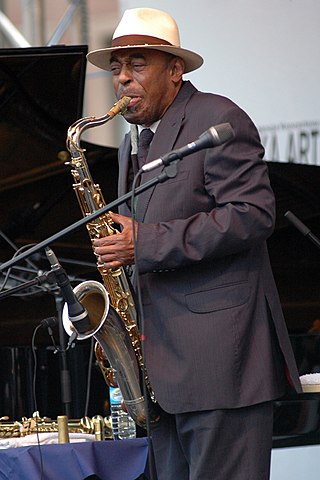
Archie Shepp is an American jazz saxophonist, educator and playwright who since the 1960s has played a central part in the development of avant-garde jazz.
Grachan Moncur III was an American jazz trombonist. He was the son of jazz bassist Grachan Moncur II and the nephew of jazz saxophonist Al Cooper.

Herman Davis "Dave" Burrell is an American jazz pianist. He has played with many jazz musicians including Archie Shepp, Pharoah Sanders, Marion Brown and David Murray.
Frank Wright was an American free jazz musician, known for his frantic style of playing the tenor saxophone. Critics often compare his music to that of Albert Ayler, although Wright "offers his honks and squawks with a phraseology derived from the slower, earthier funk of R&B and gospel music." According to AllMusic biographer Chris Kelsey, Wright "never recorded even a single record under his own name for a major label; he was 'underground' his entire career." In addition to tenor saxophone, Wright also played the soprano saxophone and bass clarinet.
Muhammad Ali is an American free jazz drummer.

Noah Howard was an American free jazz alto saxophonist.

Bobby Few was an American jazz pianist and vocalist.

Pitchin Can is an album by jazz saxophonist Archie Shepp recorded in Paris, France, in 1969 and 1970 for the America label. The album features one track by Shepp with Clifford Thornton, Noah Howard, Julio Finn, Leroy Jenkins, Dave Burrell, Earl Freeman, Sunny Murray and Chicago Beau and one extended track by Shepp with Thornton, Lester Bowie, Alan Shorter, Bobby Few, Bob Reid, Muhammad Ali, Djibrill and Ostaine Blue Warner.
Arthur Jones was an American Free Jazz alto saxophonist known for his highly energetic but warm tones.

Chambers' Music is the debut album by jazz bassist Paul Chambers. It was released in September 1956 on the Jazz West label. It features Chambers with his Miles Davis bandmates, tenor saxophonist John Coltrane and drummer Philly Joe Jones, along with pianist Kenny Drew, and baritone saxophonist Pepper Adams and trombonist Curtis Fuller on three tracks.
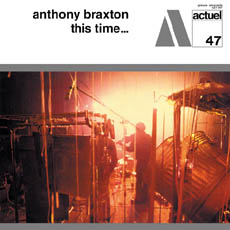
This Time... is an album by the American jazz saxophonist and composer Anthony Braxton, recorded in 1970 and released on the BYG Actuel label. As on his previous album, Braxton performs with trumpeter Wadada Leo Smith, violinist Leroy Jenkins and drummer Steve McCall.
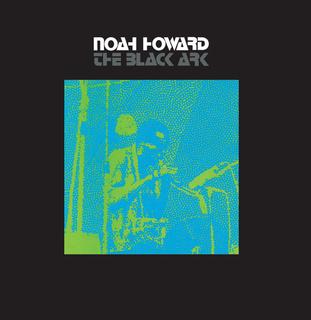
The Black Ark is an album by American free jazz saxophonist Noah Howard recorded in New York City in 1969 for the Freedom label and was rereleased in 2007.
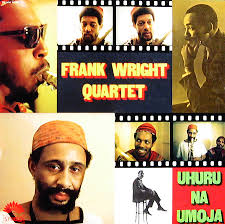
Uhuru na Umoja is an album by American free jazz saxophonist Frank Wright recorded in 1970 in Paris, originally released on the French America label and reissued on CD in 2004 by Universal France. Wright leads a quartet featuring alto saxophonist Noah Howard, who composed each of the tracks, pianist Bobby Few and bebop drummer Art Taylor in his first free jazz date. "Oriental Mood" and "Aurora Borealis" are the same compositions as "Mount Fuji" and "Queen Anne", from Howard's The Black Ark album.

An Even Break (Never Give a Sucker) is an album by American free jazz drummer Sunny Murray. It was recorded in Paris in November 1969, and released on the BYG Actuel label in 1970. On the album, Murray is joined by saxophonists Byard Lancaster and Kenneth Terroade, and bassist Malachi Favors.

Noah Howard Quartet is the debut album by alto saxophonist Noah Howard. It was recorded in New York City during January 1966, and was released later that year by ESP-Disk. On the album, Howard is joined by trumpeter Ric Colbeck, bassist Scotty Holt, and percussionist Dave Grant.
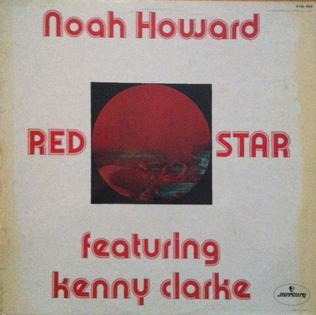
Red Star is an album by alto saxophonist Noah Howard on which he is joined by drummer Kenny Clarke. It was recorded in Paris on May 16, 1977, and was released later that year by Mercury Records. The album also features trumpeter Richard Williams, pianist Bobby Few, and bassist Guy Pederson.

Church Number Nine is an album by saxophonist Frank Wright. It was recorded in Paris on March 7, 1970, and was released in 1971 by Odeon Records in Japan. On the album, Wright is joined by saxophonist Noah Howard, pianist Bobby Few, and drummer Muhammad Ali. The French label Calumet reissued the album in 1973.
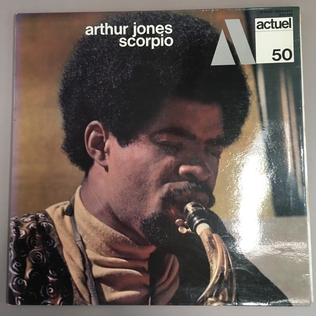
Scorpio is an album by saxophonist Arthur Jones. It was recorded at Studio Saravah in Paris during August 1969, and was released in 1971 by BYG Records as part of their Actuel series. On the album, Jones is joined by two French musicians, bassist Beb Guérin and drummer Claude Delcloo.

Space Dimension is an album by alto saxophonist Noah Howard. It was recorded during 1970 in Paris, and was released on vinyl in 1971 by America Records. In 2019, it was reissued by Eating Standing, an Italian label. On the album, Howard is joined by tenor saxophonist Frank Wright, pianist Bobby Few, and drummer Art Taylor. Drummer Muhammad Ali also appears on one track. Space Dimension is one of four albums recorded in Paris by the group, the others, credited to Wright, being Uhuru na Umoja, One for John, and Church Number Nine.
















